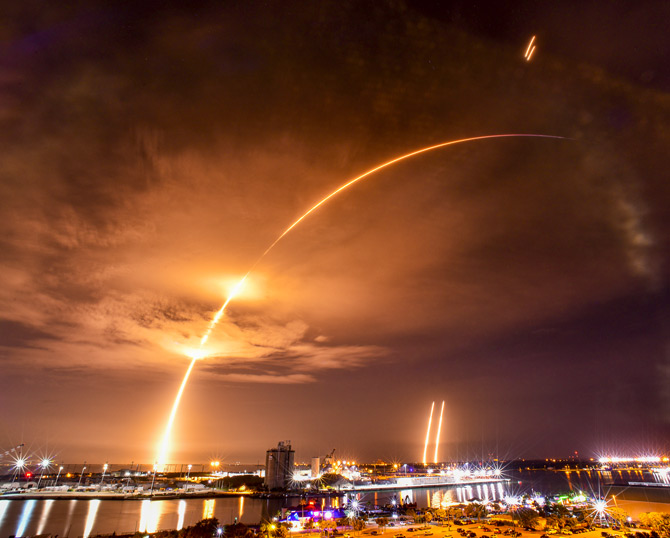
Space Operations
Space Operations at Port Canaveral
Port Canaveral has played a key role in America's space program since its beginning. Today, as one of the nation's premier seaports and a significant economic driver for the state of Florida, Port Canaveral continues to provide critical support for commercial, civilian, and national security space missions. Launch and recovery operations for companies such as SpaceX, Blue Origin, ULA, and other launch providers are carried out at Port Canaveral.

Space Operations Highlights
FY 2024
Launch Recoveries
TBD
Launch Service Providers
SpaceX & Blue Origin
Drone Ships
TBD
Recovery Vessels
TBD
The Future is Now
The growth of commercial space operations on the Space Coast is most notably marked by the rapid pace of change. The expansion of the industry over the last decade is unprecedented in the history of space missions with more companies entering the race to provide affordable and reliable launch vehicles for space exploration, satellite deployment, and even space tourism. Port Canaveral has been leading the way in supporting launch service providers who have uniquely proven and successfully incorporated the use of maritime assets into their diverse concepts of rocket launch and booster recovery operations
Where Sea and Space Unite
Port Canaveral has for several years provided a unique array of landside and waterside assets to support the evolving and expanding needs of commercial space companies who have established Florida operations at launch sites near Kennedy Space Center, NASA, and Cape Canaveral Space Force Base. Our partnership with commercial space began in late December 2015, when SpaceX's autonomous spaceport drone ship Of Course I Still Love You (OCISLY) arrived at Port Canaveral along with her towing tugs "Elsbeth II and Ill" to begin supporting the company's Atlantic Coast launches. In April 2016, OCILY had her first at-sea landing of a SpaceX first stage rocket, the first ever drone ship landing in aerospace history. By 2019, Port Canaveral had become "homeport" for berthing seven SpaceX maritime assets. This included two autonomously operated "drone ships" (specialty converted barges) for at-sea rocket booster landings, and five offshore fairing recovery and supply vessels and tugboats - a unique fleet that supported 13 launches that year. Today, the SpaceX fleet at Port Canaveral stands at six vessels - two drone ships and four recovery vessels - with 61 SpaceX launches completed in 2022.
Wharfed and Ready To Go
There's much more to Port Canaveral's partnership with commercial space companies. Port Canaveral has put in place flexible land and building lease agreements to support their landside operations such as booster recovery and transport, vessel supply and maintenance, and office space for employees. Commercial space companies are using these upland land sites for processing and storing rocket boosters and other aerospace components, research and development, in addition to construction of a proposed hangar facility adjacent to the offloading berth. Commercial space companies are also benefiting from using Port Canaveral's mobile harbor crane, which was specifically designed and engineered to handle the recovery and shoreside placement of rocket boosters.
Partnership Has its Advantages
The diverse commercial space fleet of mission support vessels including autonomous drone landing ships, launch vehicle recovery and supply ships, and tugs occupy more berth space at Port Canaveral than any other vessel operation. Services and operational space at Port Canaveral provide significant cost-saving advantages to commercial space companies and promotes their growth.
What the Future Holds
Port Canaveral took the leading role in changing the multi-agency communications of launch notices to improve the coordination of accurate and timely Notices to Mariners to de-conflict commercial and recreational vessel operations from mission hazard areas. With more launch service providers on the horizon with even more maritime assets in their operations portfolios, Port Canaveral has also initiated a state level, multi-agency review of port berthing options to meet the growing needs of the commercial space industry.
